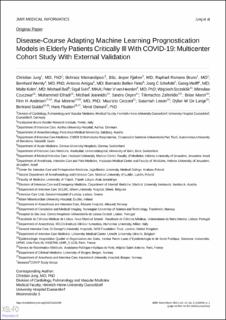| dc.contributor.author | Jung, Christian | |
| dc.contributor.author | Mamandipoor, Behrooz | |
| dc.contributor.author | Fjølner, Jesper | |
| dc.contributor.author | Bruno, Raphael Romano | |
| dc.contributor.author | Wernly, Bernhard | |
| dc.contributor.author | Artigas, Antonio | |
| dc.contributor.author | Pinto, Bernardo Bollen | |
| dc.contributor.author | Schefold, Joerg C. | |
| dc.contributor.author | Wolff, Georg | |
| dc.contributor.author | Kelm, Malte | |
| dc.contributor.author | Beil, Michael | |
| dc.contributor.author | Sviri, Sigal | |
| dc.contributor.author | van Heerden, Peter V. | |
| dc.contributor.author | Szczeklik, Wojciech | |
| dc.contributor.author | Czuczwar, Miroslaw | |
| dc.contributor.author | Elhadi, Muhammed | |
| dc.contributor.author | Joannidis, Michael | |
| dc.contributor.author | Oeyen, Sandra | |
| dc.contributor.author | Zafeiridis, Tilemachos | |
| dc.contributor.author | Marsh, Brian | |
| dc.contributor.author | Andersen, Finn Husøy | |
| dc.contributor.author | Moreno, Rui | |
| dc.contributor.author | Cecconi, Maurizio | |
| dc.contributor.author | Leaver, Susannah | |
| dc.contributor.author | De Lange, Dylan W. | |
| dc.contributor.author | Guidet, Bertrand | |
| dc.contributor.author | Flaatten, Hans Kristian | |
| dc.contributor.author | Osmani, Venet | |
| dc.date.accessioned | 2022-12-01T08:43:42Z | |
| dc.date.available | 2022-12-01T08:43:42Z | |
| dc.date.created | 2022-05-04T15:35:52Z | |
| dc.date.issued | 2022 | |
| dc.identifier.citation | JMIR Medical Informatics. 2022, 10 (3), 1-14. | en_US |
| dc.identifier.issn | 2291-9694 | |
| dc.identifier.uri | https://hdl.handle.net/11250/3035205 | |
| dc.description.abstract | Background:The COVID-19 pandemic caused by SARS-CoV-2 is challenging health care systems globally. The disease disproportionately affects the elderly population, both in terms of disease severity and mortality risk. Objective:The aim of this study was to evaluate machine learning–based prognostication models for critically ill elderly COVID-19 patients, which dynamically incorporated multifaceted clinical information on evolution of the disease. Methods:This multicenter cohort study (COVIP study) obtained patient data from 151 intensive care units (ICUs) from 26 countries. Different models based on the Sequential Organ Failure Assessment (SOFA) score, logistic regression (LR), random forest (RF), and extreme gradient boosting (XGB) were derived as baseline models that included admission variables only. We subsequently included clinical events and time-to-event as additional variables to derive the final models using the same algorithms and compared their performance with that of the baseline group. Furthermore, we derived baseline and final models on a European patient cohort, which were externally validated on a non-European cohort that included Asian, African, and US patients. Results:In total, 1432 elderly (≥70 years old) COVID-19–positive patients admitted to an ICU were included for analysis. Of these, 809 (56.49%) patients survived up to 30 days after admission. The average length of stay was 21.6 (SD 18.2) days. Final models that incorporated clinical events and time-to-event information provided superior performance (area under the receiver operating characteristic curve of 0.81; 95% CI 0.804-0.811), with respect to both the baseline models that used admission variables only and conventional ICU prediction models (SOFA score, P<.001). The average precision increased from 0.65 (95% CI 0.650-0.655) to 0.77 (95% CI 0.759-0.770). Conclusions:Integrating important clinical events and time-to-event information led to a superior accuracy of 30-day mortality prediction compared with models based on the admission information and conventional ICU prediction models. This study shows that machine-learning models provide additional information and may support complex decision-making in critically ill elderly COVID-19 patients. | en_US |
| dc.language.iso | eng | en_US |
| dc.publisher | JMIR Publications | en_US |
| dc.relation.uri | https://medinform.jmir.org/2022/3/e32949 | |
| dc.rights | Navngivelse 4.0 Internasjonal | * |
| dc.rights.uri | http://creativecommons.org/licenses/by/4.0/deed.no | * |
| dc.title | Disease-Course Adapting Machine Learning Prognostication Models in Elderly Patients Critically Ill With COVID-19: Multicenter Cohort Study With External Validation | en_US |
| dc.title.alternative | Disease-Course Adapting Machine Learning Prognostication Models in Elderly Patients Critically Ill With COVID-19: Multicenter Cohort Study With External Validation | en_US |
| dc.type | Peer reviewed | en_US |
| dc.type | Journal article | en_US |
| dc.description.version | publishedVersion | en_US |
| dc.source.pagenumber | 1-14 | en_US |
| dc.source.volume | 10 | en_US |
| dc.source.journal | JMIR Medical Informatics | en_US |
| dc.source.issue | 3 | en_US |
| dc.identifier.doi | 10.2196/32949 | |
| dc.identifier.cristin | 2021527 | |
| cristin.ispublished | true | |
| cristin.fulltext | original | |
| cristin.qualitycode | 1 | |

